
Considering the macabre details of Jeffrey Epstein’s home life and his total lack of remorse over his predation, it shouldn’t be surprising that his efforts to intimidate journalists investigating his dealings went beyond the usual playbook of harassment and bury-’em-in-paper lawsuits. According to a report by NPR’s “All Things Considered,” Epstein gruesomely threatened Vanity Fair editor Graydon Carter into pulling journalist Vicky Ward off the trail of Epstein’s sexual abuse of minors after she wrote a profile on him in 2003.
Last month, Ward accused Carter of removing on-the-record allegations of abuse from sisters Maria and Annie Farmer — who claim Epstein sexually assaulted them when Annie was 15 years old — after the financier pressured the editor in person. “It came down to my sources’ word against Epstein’s,” she wrote in the Daily Beast in 2015, adding that “at the time Graydon believed Epstein.” Carter also stated this week that the reason the allegations of sexual abuse were cut was because Ward did not have three sources to verify the claims, and that the reporting did not meet the magazine’s “legal threshold.” In a statement to NPR, Carter said that Vanity Fair didn’t pull the reporting because of any sense of threat.
But according to “All Things Considered,” shortly after the publication of the Epstein profile in March 2003, Carter called contributing editor John Connolly — who published a book about Epstein with James Patterson in 2017 — and told him that a bullet had been placed outside his front door:
Even in the absence of any evidence Epstein was involved, Connolly says, both Carter and he considered the bullet a clear warning from Epstein. Another former colleague, who spoke on condition of anonymity, recalls receiving an anguished call from Carter linking the bullet to Epstein. (NPR asked Carter repeatedly over the course of a week for his recollections of the bullet incident along with other elements presented here. After this story was broadcast and posted, his spokeswoman wrote to say Carter recalled the bullet appearing in 2004, not 2003.)
In 2006, as federal authorities investigated Epstein for soliciting minors, Connolly went to Florida on a reporting trip to speak with the financier’s female employees. While there, he says Carter called him and told him that in his front yard in Connecticut, there was the severed head of a cat. Other Vanity Fair staffers confirmed that there was contemporaneous office talk around the dead cat. “It was done to intimidate,” Connolly told NPR. “No question about it.” (In a statement to New York, Carter said: “There was no investigation and I have no idea who was responsible, but my wife and I remember attributing them to the work of aggrieved George W. Bush supporters. To suggest that either of these incidents affected my editorial judgment is flatly wrong.”)
NPR’s David Folkenflik describes other attempts to kill the stories of Epstein’s accusers; while these efforts may not share the same intensity and mob-like intimidation, they depict the more traditional, and often successful, routes of the wealthy to suppress bad press. In 2015, ABC reporters Amy Robach and Jim Hill secured an interview with Virginia Giuffre, in which she discussed being sexually trafficked as a minor. The interview never aired:
One ABC News staffer with knowledge of events says the network received a call from one of Epstein’s top lawyers: Harvard law professor emeritus Alan Dershowitz. And Giuffre and her lawyers placed great significance on that call.
Dershowitz tells NPR he intervened after learning ABC was on the brink of broadcasting its interview with Giuffre. He says he believes he spoke with two producers and a lawyer within the same 24-hour period.
“I did not want to see [Giuffre’s] credibility enhanced by ABC,” Dershowitz says.
In a December 2014 court filing in another accuser’s lawsuit, Giuffre had alleged Dershowitz was among the prominent men Epstein had instructed her to have sex with when she was a teenager. In early 2015, Dershowitz had rejected her account out of hand in his own court filings. (The nature of his denials were such that Giuffre sued Dershowitz for defamation earlier this year. Dershowitz has asked the court to dismiss that lawsuit.)
The NPR report also provides more context for this month’s strange account of New York Times business columnist James B. Stewart, who visited Epstein’s Manhattan townhouse in 2018 to discuss rumors that Elon Musk was speaking to him in an unofficial advisory role. Stewart was not the Times’ first choice to talk to Epstein — that honor belonged to financial correspondent Landon Thomas Jr., until it was stripped from him:
This account is based on interviews with five current and former New York Times staffers with knowledge of the episode. They spoke on condition they not be directly named; while the Times confirmed the contours of the incident, it declined to authorize its journalists to comment. Thomas also declined to comment for this story.
But Thomas flagged a problem. He told his editors Epstein had been a great source for years and had become something of a friend as well. How close? Thomas had solicited a $30,000 contribution from Epstein for a Harlem cultural center, he told them.
Thomas suggested Epstein was just a source of information, not someone he would report on or investigate. His editors were aghast. They rejected the distinction he was trying to make.
And his editors benched him instantly from any professional contact with Epstein.
“Soliciting a donation to a personal charity is a clear violation of the policy that governs Times journalists’ relationships with their sources,” said the Times Co.’s chief spokesperson, Eileen Murphy. “As soon as editors became aware of it, they took action.”
Thomas, who wrote a flattering profile of Epstein in 2008, declined to speak to NPR.
This post has been updated with an additional statement from Graydon Carter.






























